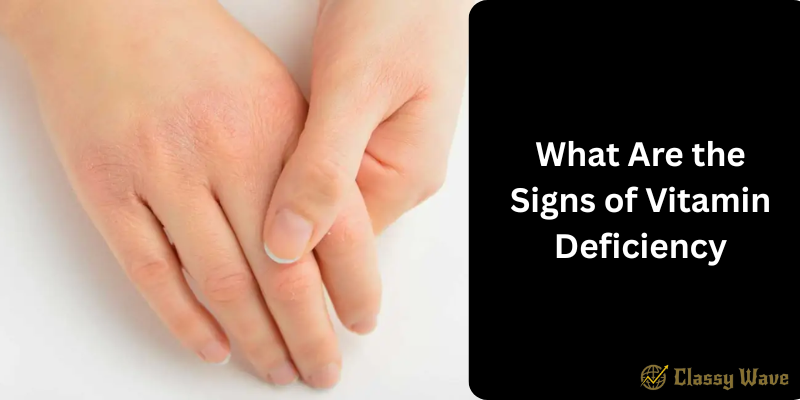What Are the Signs of Vitamin Deficiency | Classy Wave
Ever feel tired for no reason, have dull skin, or experience frequent colds? These could be signs your body isn’t getting enough vitamins. Vitamins are essential nutrients that support your body’s everyday functions — from keeping your energy levels high to maintaining healthy skin and immunity. When your body doesn’t get what it needs, it starts to show warning signs. Let’s explore the most common signs of vitamin deficiency and what you can do about them.
Why Vitamins Are So Important
Vitamins act as the fuel your body needs to function properly. They help convert food into energy, repair cells, and strengthen your immune system. Each vitamin plays a unique role — for example, Vitamin D supports bone health, while Vitamin C boosts your immune defense. A lack of these nutrients can cause noticeable physical and mental symptoms.
Common Signs of Vitamin Deficiency
1. Fatigue and Low Energy
Feeling constantly tired, even after a good night’s sleep, may point to a deficiency in vitamins such as B12, Vitamin D, or Iron. These nutrients help your body produce red blood cells and energy. Without them, oxygen supply to your organs drops, making you feel sluggish.
2. Weak or Brittle Hair and Nails
If your hair is thinning or your nails break easily, you might be low in Biotin (Vitamin B7), Iron, or Zinc. These vitamins and minerals are crucial for cell growth and protein production that keeps your hair and nails strong.
3. Pale or Yellowish Skin
Pale skin or a yellow tint could indicate a Vitamin B12 deficiency. B12 helps produce red blood cells, which give your skin its healthy color. Low levels can cause anemia, leading to paleness and tiredness.
4. Cracked Lips and Mouth Ulcers
Painful cracks at the corners of your mouth or frequent ulcers may be due to Vitamin B2 (Riboflavin), B3 (Niacin), or Iron deficiency. These vitamins help maintain healthy skin and mucous membranes.
5. Poor Vision and Night Blindness
Struggling to see in low light or experiencing dry eyes might mean you’re low in Vitamin A. This vitamin is essential for maintaining good vision and eye health.
6. Frequent Illness or Slow Recovery
If you often catch colds or take longer to recover, your immune system may be weak. A Vitamin C or Vitamin D deficiency could be to blame. Both are vital for immune function and infection resistance.
7. Numbness or Tingling in Hands and Feet
A lack of Vitamin B12 or B6 can affect nerve function, leading to sensations of numbness, tingling, or pins and needles. Left untreated, it can even lead to nerve damage.
8. Bleeding Gums or Easy Bruising
If your gums bleed while brushing or you bruise easily, your body may lack Vitamin C. This vitamin is needed to produce collagen — a protein that strengthens blood vessels, skin, and tissues.
9. Bone Pain or Weakness
Persistent bone or joint pain can signal a Vitamin D deficiency. Vitamin D helps your body absorb calcium, keeping your bones strong and healthy. Without it, bones become soft and brittle.
10. Mood Swings and Depression
Low levels of Vitamin D, B12, and Folate (B9) have been linked to mood disorders and depression. These vitamins help produce serotonin — the “feel-good” chemical in your brain.
11. Dry Skin and Hair
Dry, flaky skin or dull hair might mean your body lacks Vitamin E, A, or Omega-3 fatty acids. These nutrients keep your skin hydrated and protect cells from damage.
12. Slow Wound Healing
If your cuts or bruises take longer to heal, your body might need more Vitamin C, Vitamin K, or Zinc. These nutrients play a key role in tissue repair and blood clotting.
Who Is at Risk of Vitamin Deficiency?
Some people are more likely to experience vitamin deficiencies than others, including:
- Vegetarians or vegans (especially for B12 and Iron)
- Elderly individuals
- People with digestive issues (like celiac or Crohn’s disease)
- Pregnant or breastfeeding women
- Those with poor diets or restricted food intake
How to Prevent Vitamin Deficiency
- Eat a balanced diet: Include a variety of fruits, vegetables, whole grains, and lean proteins.
- Take supplements if needed: Ask your doctor before starting any vitamin supplements.
- Spend time in sunlight: Helps your body produce Vitamin D naturally.
- Stay hydrated: Water aids in nutrient absorption and circulation.
- Get regular checkups: A blood test can easily detect vitamin deficiencies before they cause major issues.
When to See a Doctor
If you experience persistent symptoms like fatigue, dizziness, numbness, or vision problems, it’s best to consult a healthcare professional. They can run simple tests to check your vitamin levels and recommend dietary changes or supplements.
Conclusion
Your body gives you clues when something’s wrong — you just have to pay attention. Recognizing the signs of vitamin deficiency early can help you make small adjustments that lead to big health improvements. Remember, eating a well-balanced diet and maintaining a healthy lifestyle are your best defenses against deficiencies.







